人教版选修7 unit 5 Travelling abroad Using-language(共67张PPT)
文档属性
| 名称 | 人教版选修7 unit 5 Travelling abroad Using-language(共67张PPT) |
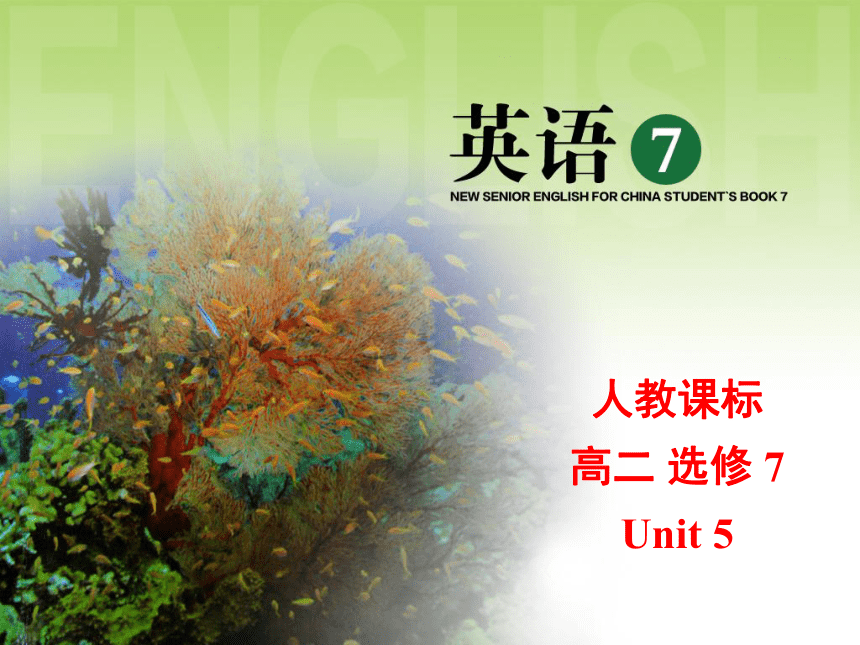
|
|
| 格式 | zip | ||
| 文件大小 | 7.7MB | ||
| 资源类型 | 教案 | ||
| 版本资源 | 人教版(新课程标准) | ||
| 科目 | 英语 | ||
| 更新时间 | 2020-03-08 00:00:00 | ||
图片预览

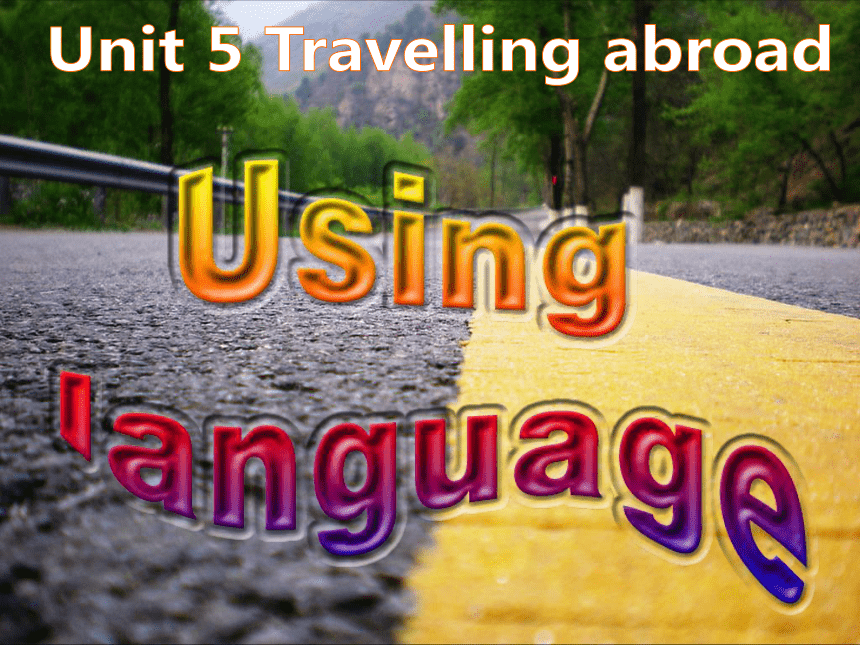
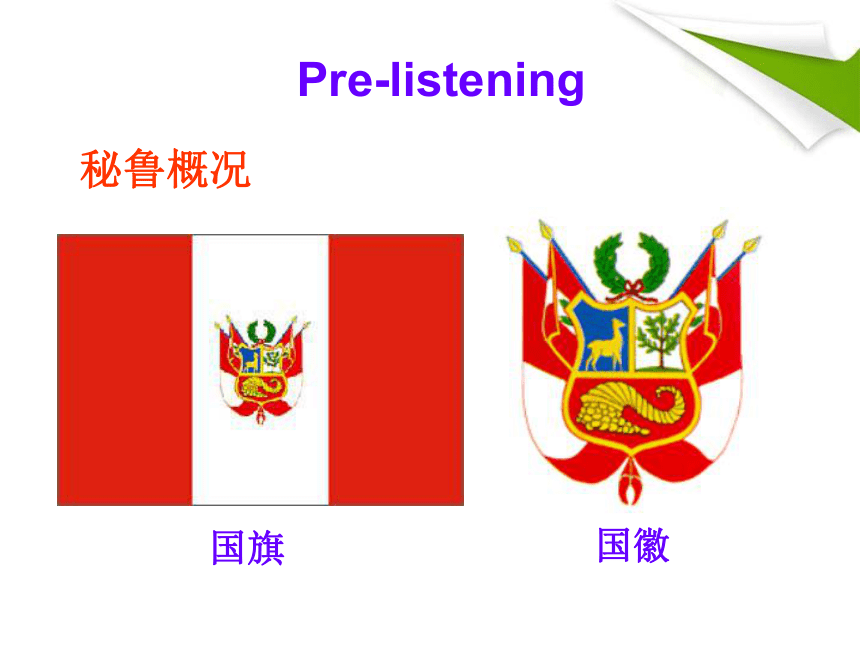
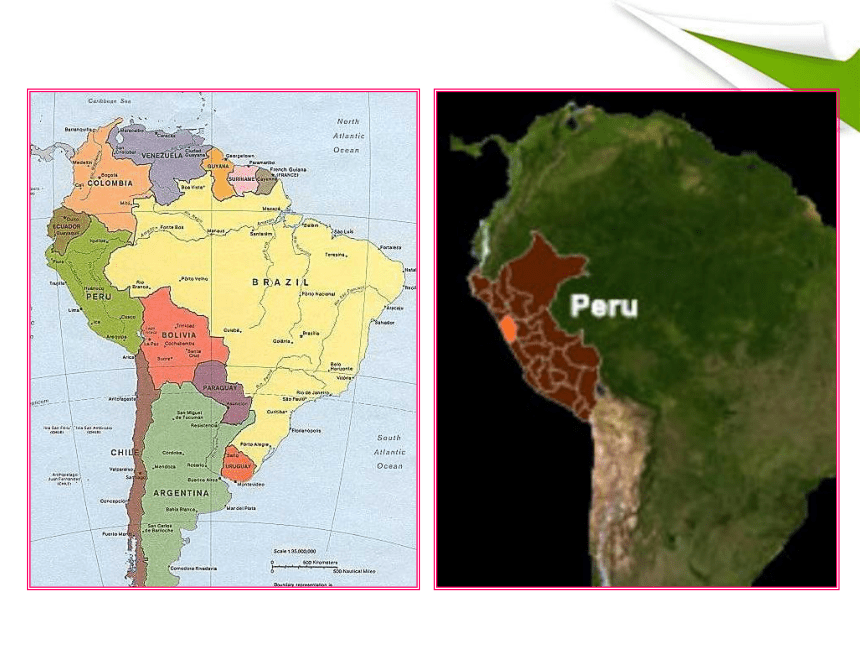
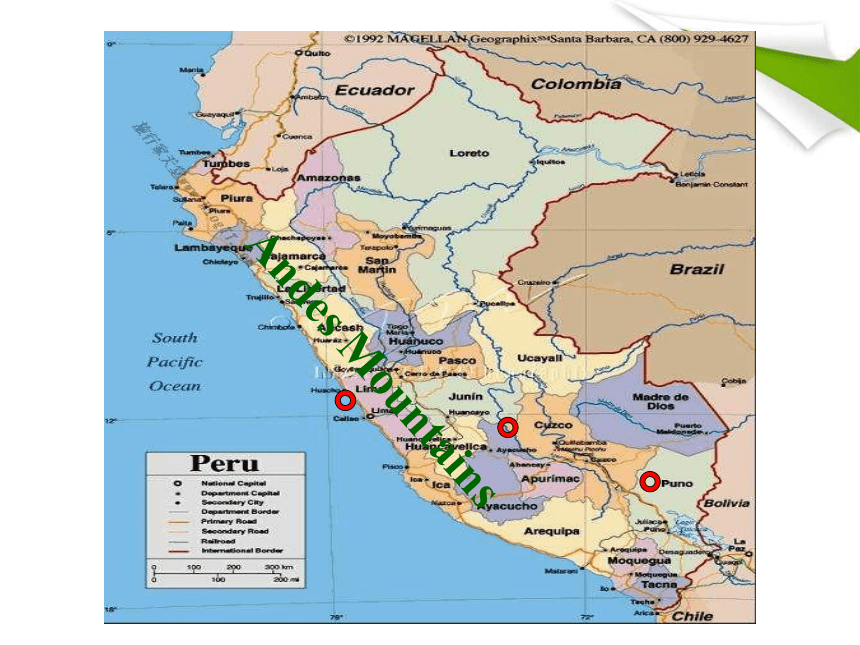
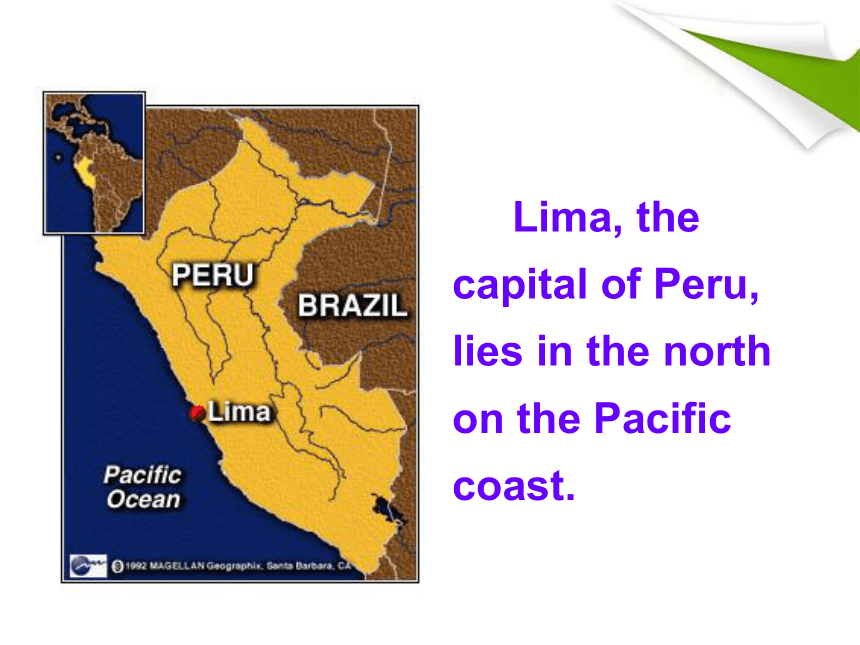
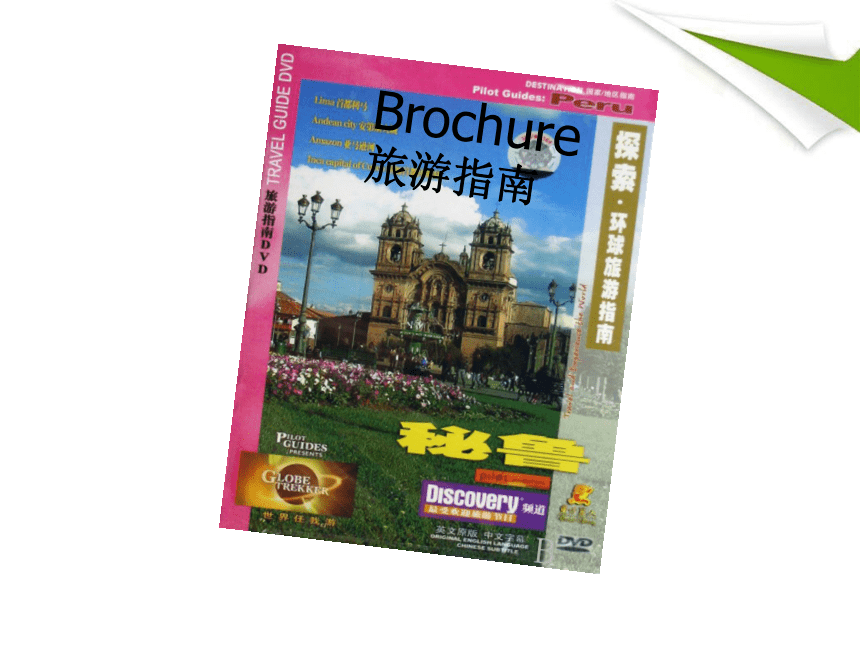
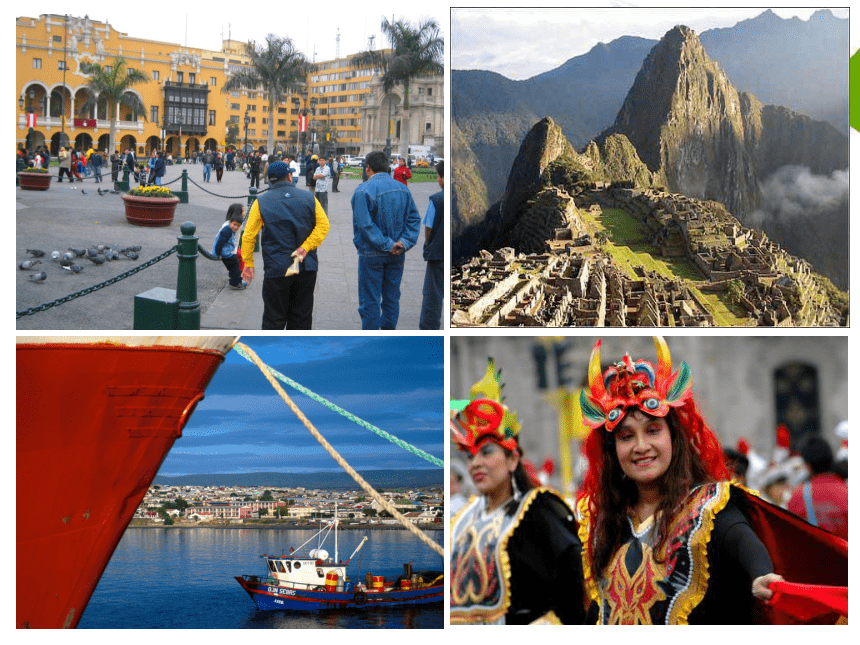
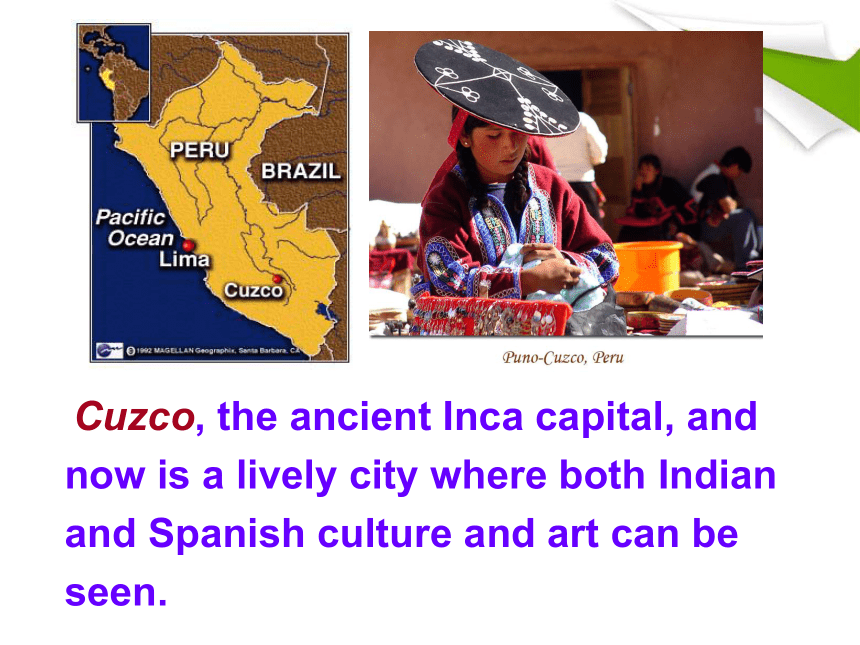
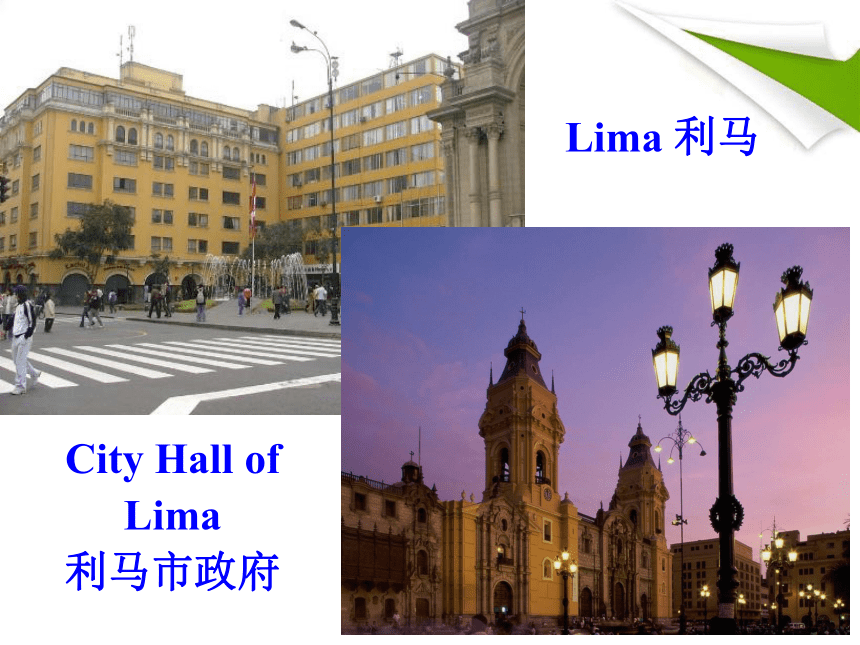
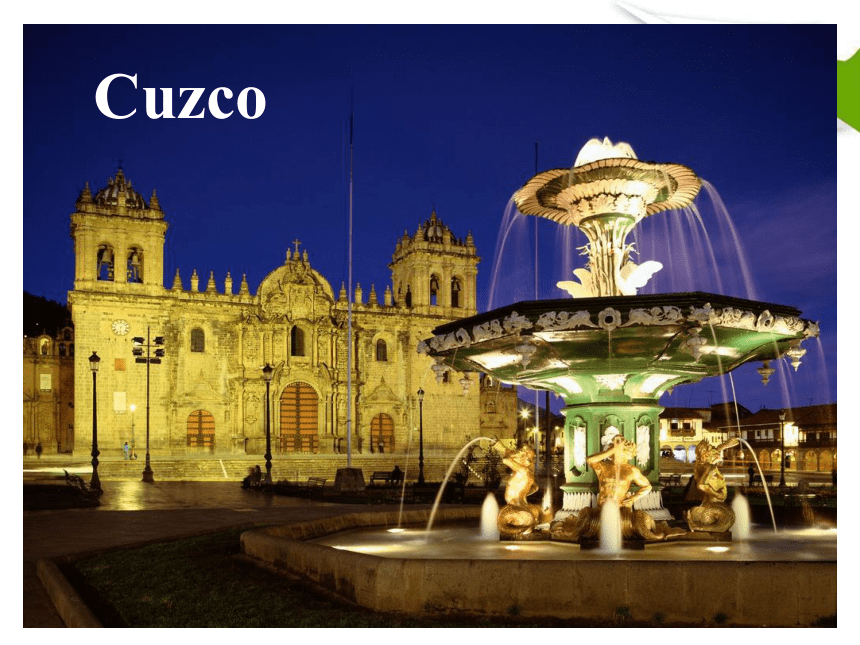
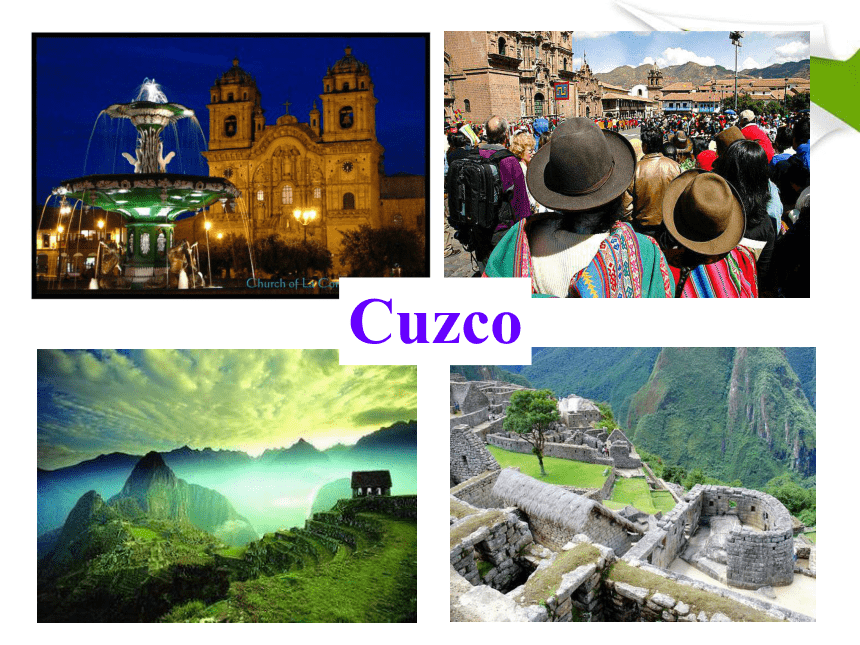
文档简介
(共69张PPT)
人教课标
高二 选修 7 Unit 5
国旗
国徽
秘鲁概况
Pre-listening
Andes Mountains
Lima, the capital of Peru, lies in the north on the Pacific coast.
Cuzco, the ancient Inca capital, and now is a lively city where both Indian and Spanish culture and art can be seen.
City Hall of Lima
利马市政府
Lima 利马
Cuzco
Cuzco
The Andes Mountains, runs parallel to the Pacific coast, and it is the longest Mountains in the world.
“the”用在江河湖海、山脉、群岛、海峡、沙漠等地理名词前。
□ visiting museums
□ climbing mountains
□ looking at wildlife □learning about a
country’s culture
□staying in expensive
hotels
Tick the things Lia likes doing.
□ visiting places on
her own
□ trying different
kinds of food
□ going to historical
sites
□ cycling
√
√
√
√
√
Has Lia been to Peru before?
2. Why doesn’t Lia want to go on a tour?
No.
Because she likes to be independent.
Listen again and answer the questions.
3. Why does the travel agent advise her not to travel alone?
She might feel lonely. She might find it difficult because it’s her first visit.
4. Why does the travel agent recommend Cuzco for Lia to visit?
5. How will Lia know about tours from Cuzco?
Cuzco combines many of the things Lia likes doing. She can stay on her own in a hotel and take tours when she wants some company.
The travel agent gives her a brochure.
1. I _________ independent.
2. But you ___________________ because it’s your first visit.
3. But I also ______________.
4. You _______ from Lima, the capital of Peru, to Cuzco.
5. We ______________ into a hotel in Cuzco.
like to be
might find it difficult
love mountains
can fly
could book you
Listen again and complete the sentences.
1. Why is Cuzco popular with tourists?
Cuzco is popular because it is close to Machu Picchu and is a good place to see both Spanish and Indian culture and art.
2. What is special about Lake Titicaca?
Lake Titicaca is the highest navigable lake in the world, on which boats can travel.
3. What do you think the two official languages of Peru are?
Spanish and Indian.
Peru
Lima
South America
coastal
The Andes
plains
Governed
1821
abundant
Mountains
Capital _______
Position On the Pacific coast of ____________
A narrow ______ belt __________
_________ running parallel to the coast
High, flat ______ in the southeast
History _________ by Spain from the 16th century; Independent in _____
Resource A wide variety of plants and _________ wildlife
Read the text on Page 44, and answer the following questions.
Tour 1:
What can people see on tour 1?
2. In what way will people travel on tour 1?
3. How long will tour 1 last?
What can people see on tour 1?
Jungle, wildlife, mountain scenery, ancient ruins, sunrise on Andes.
2. In what way will people travel on tour 1?
On hike, train.
3. How long will tour 1 last?
Four days.
Tour 2:
4. What places will people get to?
5. In what way will people get there?
6. What can people do on this tour?
4. What places will people get to?
Cuzco, Puno, Lake Titicaca, floating islands of the Uros people, Lima.
5. In what way will people get there?
By bus, boat, plane.
6. What can people do on this tour?
Fantastic view of highland, boat, stay with a local Uros family.
Tour 3:
7. What places will people get to?
8. What can people do on this tour?
Andes, Cuzco, Machu Picchu (ruins)
Learn about history, visit the museums, admire the Spanish architecture, enjoy excellent food, buy souvenirs, view the ancient ruins.
Tour 4:
9. What places will people get to?
10. In what way will people get there?
11. What can people do on this tour?
Cuzco, Andes, Amazon jungle.
By plane, boat.
Enjoy the view of Andes and explore the Amazon jungle, see many birds.
What are the differences between the two introductions of Peru?
Discussion
1. The first is a factual report about the history and geography of Peru.
The second is from a travel brochure and describes tours to places in Peru.
2. The first one is to give factual information about Peru and the second is to sell tours in Peru.
语篇领悟
1. On which Tours can you visit the famous Inca ruins of the city of Machu Picchu?
A. Tour 1 and Tour 2
B. Tour 2 and Tour 3
C. Tour 1 and Tour 3
D. Tour 3 and Tour 4
Glance quickly through the brochure and then try to find out the answers to the following questions.
2. If you want to get an opportunity to learn about the Uros Indian’s life, you can choose _____.
A. Tour 1 B. Tour 2
C. Tour 3 D. Tour 4
3. You can _______ on Tour 4.
A. explore the jungle
B. enjoy some excellent food
C. buy some great souvenirs
D. Stay with a local family for a fully-day
4. What can you do on Tour 1?
A. admire the Spanish architecture
B. see the sunrise over the Andes
C. watch bird sights
D. visit the royal tomb of the Inca King
5. What kind of people would enjoy Tour 2?
A. People who loves climbing mountain
B. People who are interested in
historical sites
C. People who wants to know the
lifestyle and custom of local people
D. People who is fond of animals
especially birds.
1. Why does the travel agent advise her not to travel alone?
辨析: alone 和 lonely
alone 既可用作形容词,又可用作副词, 意为“独自的(地)、单独的(地)” , 侧重于说明独自一人, 没有同伴或助手, 指的是客观情况。
A. alone 用作形容词时,一般与 be 动词连用,在句中作表语。
She is alone at home.
(她独自一人在家。)
He is not alone in this idea.
(有这种想法的不只是他一个人。)
B. alone 用作副词修饰动词时,应该放在动词后面作状语。
I like to work alone. (我喜欢独自一人工作。)
Han Mei was reading alone when the teacher came into the classroom. (老师走进教室时, 韩梅正独自一人在看书。)
lonely 只用作形容词,它在句中既可作定语,也可作表语,表示“孤独的,寂寞的”意思。该词带有浓厚的感彩,具有“渴望得到同伴”的含义,其比较级形式为 lonelier。
A. lonely 用作定语时, 意为“孤单的, 无伴侣的, 无人烟的, 荒凉的, 偏僻的” 等。
At heart, I’m a lonely man. (内心深处我很孤独。)
That’s a lonely island. (那是一个荒凉的岛屿。)
B. lonely 用作表语时, 可以表示“孤寂的, 寂寞的”意思。
We never feel lonely in Shanghai. (在上海我们从不感到孤独。)
I was alone but I didn’t feel lonely. (我独自一人,但我并不感到孤独。)
2. The Andes Mountains running parallel to the coast.
安第斯山脉(与沿海地带)平行一直到海岸。
run v. 伸展,延伸
▲与 run 相关的短语:
run for it 逃跑
run across 偶然遇见
run out 用完
run after 追赶
run at 向某人冲去
run into sb. 撞着某人
run off 排出
run over 溢出
run away 逃走
Our money __________. We’d better buy something cheap. A. has run out B. is running out C. has run out of D. is running out of
本题的关键在于区别 run out 与 run out of: “run out of”后面一定要接宾语, 如: He has run out of the money. 若“某物”做主语必须用被动语态, 即表示“某物被用完了”, 如: The money has been run out of.
B
本题的主语是“our money”, 是“某物”, 所以若用 run out of, 必须用被动语态, 而选项中都是主动语态, 故排除C, D。
“run out”是不及物动词, 后面不能接宾语, 也不能用于被动语态; 只能用于主动语态。而A项 has run out 表示“已经用完了”, 与后句的“We’d better buy something cheap (我们最好买些便宜的)”相矛盾, 因此排除A。而 is running out 表示“快要用完了”, 与后句意思相符, 故选B 。
3. In the high plains area is Lake Titicaca, the highest lake in the world, on which boats can travel.
完全倒装句:
介词短语 + 谓语动词 + 主语 + ……
当表示地点的介词短语, 如: on a hill, in the valley, round the corner, at the foot of 等放在句首时, 谓语部分为 be, stand, lie, sit 等, 主语为名词, 这时采用全部倒装。
副词/副词短语 + 谓语动词 + 主语+ ……
如果副词或副词短语, 如: in, up, down, out, away 等位于句首,动词为 come, lie, stand, walk, rush 等, 主语为名词时, 常用完全倒装, 即将整个谓语部分放在主语前面。
注意:
全部倒装必须符合三个条件, 一是把介词短语、副词或副词短语放在句首, 二是谓语动词为be, go, come, walk, run, fly, rush等,三是主语必须是名词。如果主语为代词, 则谓语仍放在主语之后。
e.g. Here comes the bus. 车来了。
Here it comes. 它来了。
根据汉语提示完成句子。
1. ________________________________ ____________________ (远处那座大山 的山脚下坐落着一个小村庄), which is my village.
2. ______________________ (孩子们冲出 了教室) as soon as the bell rang.
At the foot of the mountain in the distance sits a village
Out rushed the children
4. Peru has abundant plants from desert grasses to vast areas of jungle.
秘鲁有着多种多样的植物, 从沙漠中的草到大片的丛林。
abundant adj.
be abundant in 富于......, ......很丰富
abundance n. 丰富
in abundance 大量,充裕
an abundance of 很多的......
5. Cuzco is a lively city with many hotels and inns, where both Indian and Spanish culture and art can be seen. 库斯科有很多旅店和酒吧, 是一座有活力的城市, 在那儿你可以看到印第安人和西班牙人的文化和艺术。
1) lively 活泼的,生动的,有生气的
作定语和表语
a lively mind 头脑灵活的
2) alive 活着的,活的
作定语放于名词后,表语形容词
= living
His dog is alive.
the greatest man alive
keep sth. alive
3) living 活着的, 逼真的 + n.
the living writer
the livings
4) live 现场直播的, 活着的
a live whale
The football match will be broadcast live.
alive living live life lively
1.?Pandas usually ____ in the south and southeast of China.
2.?There aren’t many pandas __________ in the world today.
live
alive/living
Choose the correct words to fill on the blanks.
3. Nothing can ______ without air or water.
4. Are there any _______ things on one of the stars?
5. He had a strange way of making his lessons _______ and interesting.
6.?The old couple _____ a happy life.
live
lively
living
live
7.?It was a _____ TV broadcast, not a cassette recording.
8.?Look! The fish is still ______. It’s a _______ fish. Put it into water and keep it ______.
alive
living
alive
live
6. The following tours are based at Cuzco, the site of the ancient capital of the Inca civilization. …以下的旅行是以库斯科为基地展开的,库斯科是印加文明古老首都的所在地。
(1) 把某事作为另一事的证据
base sth. on sth.
be based on sth.
The novel is based on historical facts.
We based our hopes on the good news.
(2) 把事/人安置在某地(进行工作或活动)
base sb. in / at
be based in / at
where are you based now?
I. 根据下列各句句意及所给单词的汉 语 提示,写出该单词的正确形式。
1. After climbing across the steep mountains, our army finally reached the __________ (目的地).
2. He devoted himself to writing out a long-term policy to ________ (统治) the country.
govern
destination
3. If you’re going to rent out your house while you’re abroad, you’ll need someone to act as your ______ (代理 人) here.
4. I walked the length of the main street twice, looking for a(n) ______ (客栈) or a place of refreshment.
agent
inn
5. When they opened up the ______ (坟 墓), they didn’t find any of the treasures they heard about before.
6. The village stands along a single street roughly ______ (平行的) with the river.
7. Nowadays, frozen food is very _________ (丰富的) which brings convenience to thousands of families.
abundant
parallel
tomb
II. 用适当的介词或副词填空。
1. That song was popular _____ people from my father’s generation.
2. The teacher told the children to close _____ to each other near the campfire and then began his story.
with
up
3. They ran all the way just ____ time to catch the bus.
4. Nigeria gained independence _____ Britain in 1960.
5. The house was made _____ wood with an iron roof.
in
from
of
1. We had no money, so it was _________
_________ for us to go to the movies.
2. It was the first time she had left home, so it took her a while to ________.
3. I couldn’t stand sitting at a desk _________________.
question
settle in
day in and day out
day in and day out
out of the question settle in
out of the
III. 用方框内所给短语的适当形式填空。
1. Try to know more about Peru after class.
2. Review the restrictive attributive clause.
人教课标
高二 选修 7 Unit 5
国旗
国徽
秘鲁概况
Pre-listening
Andes Mountains
Lima, the capital of Peru, lies in the north on the Pacific coast.
Cuzco, the ancient Inca capital, and now is a lively city where both Indian and Spanish culture and art can be seen.
City Hall of Lima
利马市政府
Lima 利马
Cuzco
Cuzco
The Andes Mountains, runs parallel to the Pacific coast, and it is the longest Mountains in the world.
“the”用在江河湖海、山脉、群岛、海峡、沙漠等地理名词前。
□ visiting museums
□ climbing mountains
□ looking at wildlife □learning about a
country’s culture
□staying in expensive
hotels
Tick the things Lia likes doing.
□ visiting places on
her own
□ trying different
kinds of food
□ going to historical
sites
□ cycling
√
√
√
√
√
Has Lia been to Peru before?
2. Why doesn’t Lia want to go on a tour?
No.
Because she likes to be independent.
Listen again and answer the questions.
3. Why does the travel agent advise her not to travel alone?
She might feel lonely. She might find it difficult because it’s her first visit.
4. Why does the travel agent recommend Cuzco for Lia to visit?
5. How will Lia know about tours from Cuzco?
Cuzco combines many of the things Lia likes doing. She can stay on her own in a hotel and take tours when she wants some company.
The travel agent gives her a brochure.
1. I _________ independent.
2. But you ___________________ because it’s your first visit.
3. But I also ______________.
4. You _______ from Lima, the capital of Peru, to Cuzco.
5. We ______________ into a hotel in Cuzco.
like to be
might find it difficult
love mountains
can fly
could book you
Listen again and complete the sentences.
1. Why is Cuzco popular with tourists?
Cuzco is popular because it is close to Machu Picchu and is a good place to see both Spanish and Indian culture and art.
2. What is special about Lake Titicaca?
Lake Titicaca is the highest navigable lake in the world, on which boats can travel.
3. What do you think the two official languages of Peru are?
Spanish and Indian.
Peru
Lima
South America
coastal
The Andes
plains
Governed
1821
abundant
Mountains
Capital _______
Position On the Pacific coast of ____________
A narrow ______ belt __________
_________ running parallel to the coast
High, flat ______ in the southeast
History _________ by Spain from the 16th century; Independent in _____
Resource A wide variety of plants and _________ wildlife
Read the text on Page 44, and answer the following questions.
Tour 1:
What can people see on tour 1?
2. In what way will people travel on tour 1?
3. How long will tour 1 last?
What can people see on tour 1?
Jungle, wildlife, mountain scenery, ancient ruins, sunrise on Andes.
2. In what way will people travel on tour 1?
On hike, train.
3. How long will tour 1 last?
Four days.
Tour 2:
4. What places will people get to?
5. In what way will people get there?
6. What can people do on this tour?
4. What places will people get to?
Cuzco, Puno, Lake Titicaca, floating islands of the Uros people, Lima.
5. In what way will people get there?
By bus, boat, plane.
6. What can people do on this tour?
Fantastic view of highland, boat, stay with a local Uros family.
Tour 3:
7. What places will people get to?
8. What can people do on this tour?
Andes, Cuzco, Machu Picchu (ruins)
Learn about history, visit the museums, admire the Spanish architecture, enjoy excellent food, buy souvenirs, view the ancient ruins.
Tour 4:
9. What places will people get to?
10. In what way will people get there?
11. What can people do on this tour?
Cuzco, Andes, Amazon jungle.
By plane, boat.
Enjoy the view of Andes and explore the Amazon jungle, see many birds.
What are the differences between the two introductions of Peru?
Discussion
1. The first is a factual report about the history and geography of Peru.
The second is from a travel brochure and describes tours to places in Peru.
2. The first one is to give factual information about Peru and the second is to sell tours in Peru.
语篇领悟
1. On which Tours can you visit the famous Inca ruins of the city of Machu Picchu?
A. Tour 1 and Tour 2
B. Tour 2 and Tour 3
C. Tour 1 and Tour 3
D. Tour 3 and Tour 4
Glance quickly through the brochure and then try to find out the answers to the following questions.
2. If you want to get an opportunity to learn about the Uros Indian’s life, you can choose _____.
A. Tour 1 B. Tour 2
C. Tour 3 D. Tour 4
3. You can _______ on Tour 4.
A. explore the jungle
B. enjoy some excellent food
C. buy some great souvenirs
D. Stay with a local family for a fully-day
4. What can you do on Tour 1?
A. admire the Spanish architecture
B. see the sunrise over the Andes
C. watch bird sights
D. visit the royal tomb of the Inca King
5. What kind of people would enjoy Tour 2?
A. People who loves climbing mountain
B. People who are interested in
historical sites
C. People who wants to know the
lifestyle and custom of local people
D. People who is fond of animals
especially birds.
1. Why does the travel agent advise her not to travel alone?
辨析: alone 和 lonely
alone 既可用作形容词,又可用作副词, 意为“独自的(地)、单独的(地)” , 侧重于说明独自一人, 没有同伴或助手, 指的是客观情况。
A. alone 用作形容词时,一般与 be 动词连用,在句中作表语。
She is alone at home.
(她独自一人在家。)
He is not alone in this idea.
(有这种想法的不只是他一个人。)
B. alone 用作副词修饰动词时,应该放在动词后面作状语。
I like to work alone. (我喜欢独自一人工作。)
Han Mei was reading alone when the teacher came into the classroom. (老师走进教室时, 韩梅正独自一人在看书。)
lonely 只用作形容词,它在句中既可作定语,也可作表语,表示“孤独的,寂寞的”意思。该词带有浓厚的感彩,具有“渴望得到同伴”的含义,其比较级形式为 lonelier。
A. lonely 用作定语时, 意为“孤单的, 无伴侣的, 无人烟的, 荒凉的, 偏僻的” 等。
At heart, I’m a lonely man. (内心深处我很孤独。)
That’s a lonely island. (那是一个荒凉的岛屿。)
B. lonely 用作表语时, 可以表示“孤寂的, 寂寞的”意思。
We never feel lonely in Shanghai. (在上海我们从不感到孤独。)
I was alone but I didn’t feel lonely. (我独自一人,但我并不感到孤独。)
2. The Andes Mountains running parallel to the coast.
安第斯山脉(与沿海地带)平行一直到海岸。
run v. 伸展,延伸
▲与 run 相关的短语:
run for it 逃跑
run across 偶然遇见
run out 用完
run after 追赶
run at 向某人冲去
run into sb. 撞着某人
run off 排出
run over 溢出
run away 逃走
Our money __________. We’d better buy something cheap. A. has run out B. is running out C. has run out of D. is running out of
本题的关键在于区别 run out 与 run out of: “run out of”后面一定要接宾语, 如: He has run out of the money. 若“某物”做主语必须用被动语态, 即表示“某物被用完了”, 如: The money has been run out of.
B
本题的主语是“our money”, 是“某物”, 所以若用 run out of, 必须用被动语态, 而选项中都是主动语态, 故排除C, D。
“run out”是不及物动词, 后面不能接宾语, 也不能用于被动语态; 只能用于主动语态。而A项 has run out 表示“已经用完了”, 与后句的“We’d better buy something cheap (我们最好买些便宜的)”相矛盾, 因此排除A。而 is running out 表示“快要用完了”, 与后句意思相符, 故选B 。
3. In the high plains area is Lake Titicaca, the highest lake in the world, on which boats can travel.
完全倒装句:
介词短语 + 谓语动词 + 主语 + ……
当表示地点的介词短语, 如: on a hill, in the valley, round the corner, at the foot of 等放在句首时, 谓语部分为 be, stand, lie, sit 等, 主语为名词, 这时采用全部倒装。
副词/副词短语 + 谓语动词 + 主语+ ……
如果副词或副词短语, 如: in, up, down, out, away 等位于句首,动词为 come, lie, stand, walk, rush 等, 主语为名词时, 常用完全倒装, 即将整个谓语部分放在主语前面。
注意:
全部倒装必须符合三个条件, 一是把介词短语、副词或副词短语放在句首, 二是谓语动词为be, go, come, walk, run, fly, rush等,三是主语必须是名词。如果主语为代词, 则谓语仍放在主语之后。
e.g. Here comes the bus. 车来了。
Here it comes. 它来了。
根据汉语提示完成句子。
1. ________________________________ ____________________ (远处那座大山 的山脚下坐落着一个小村庄), which is my village.
2. ______________________ (孩子们冲出 了教室) as soon as the bell rang.
At the foot of the mountain in the distance sits a village
Out rushed the children
4. Peru has abundant plants from desert grasses to vast areas of jungle.
秘鲁有着多种多样的植物, 从沙漠中的草到大片的丛林。
abundant adj.
be abundant in 富于......, ......很丰富
abundance n. 丰富
in abundance 大量,充裕
an abundance of 很多的......
5. Cuzco is a lively city with many hotels and inns, where both Indian and Spanish culture and art can be seen. 库斯科有很多旅店和酒吧, 是一座有活力的城市, 在那儿你可以看到印第安人和西班牙人的文化和艺术。
1) lively 活泼的,生动的,有生气的
作定语和表语
a lively mind 头脑灵活的
2) alive 活着的,活的
作定语放于名词后,表语形容词
= living
His dog is alive.
the greatest man alive
keep sth. alive
3) living 活着的, 逼真的 + n.
the living writer
the livings
4) live 现场直播的, 活着的
a live whale
The football match will be broadcast live.
alive living live life lively
1.?Pandas usually ____ in the south and southeast of China.
2.?There aren’t many pandas __________ in the world today.
live
alive/living
Choose the correct words to fill on the blanks.
3. Nothing can ______ without air or water.
4. Are there any _______ things on one of the stars?
5. He had a strange way of making his lessons _______ and interesting.
6.?The old couple _____ a happy life.
live
lively
living
live
7.?It was a _____ TV broadcast, not a cassette recording.
8.?Look! The fish is still ______. It’s a _______ fish. Put it into water and keep it ______.
alive
living
alive
live
6. The following tours are based at Cuzco, the site of the ancient capital of the Inca civilization. …以下的旅行是以库斯科为基地展开的,库斯科是印加文明古老首都的所在地。
(1) 把某事作为另一事的证据
base sth. on sth.
be based on sth.
The novel is based on historical facts.
We based our hopes on the good news.
(2) 把事/人安置在某地(进行工作或活动)
base sb. in / at
be based in / at
where are you based now?
I. 根据下列各句句意及所给单词的汉 语 提示,写出该单词的正确形式。
1. After climbing across the steep mountains, our army finally reached the __________ (目的地).
2. He devoted himself to writing out a long-term policy to ________ (统治) the country.
govern
destination
3. If you’re going to rent out your house while you’re abroad, you’ll need someone to act as your ______ (代理 人) here.
4. I walked the length of the main street twice, looking for a(n) ______ (客栈) or a place of refreshment.
agent
inn
5. When they opened up the ______ (坟 墓), they didn’t find any of the treasures they heard about before.
6. The village stands along a single street roughly ______ (平行的) with the river.
7. Nowadays, frozen food is very _________ (丰富的) which brings convenience to thousands of families.
abundant
parallel
tomb
II. 用适当的介词或副词填空。
1. That song was popular _____ people from my father’s generation.
2. The teacher told the children to close _____ to each other near the campfire and then began his story.
with
up
3. They ran all the way just ____ time to catch the bus.
4. Nigeria gained independence _____ Britain in 1960.
5. The house was made _____ wood with an iron roof.
in
from
of
1. We had no money, so it was _________
_________ for us to go to the movies.
2. It was the first time she had left home, so it took her a while to ________.
3. I couldn’t stand sitting at a desk _________________.
question
settle in
day in and day out
day in and day out
out of the question settle in
out of the
III. 用方框内所给短语的适当形式填空。
1. Try to know more about Peru after class.
2. Review the restrictive attributive clause.
